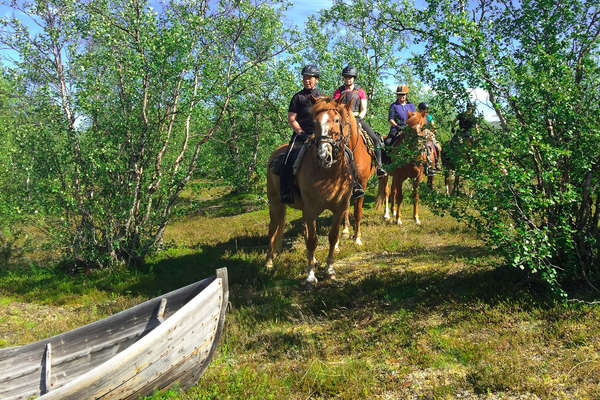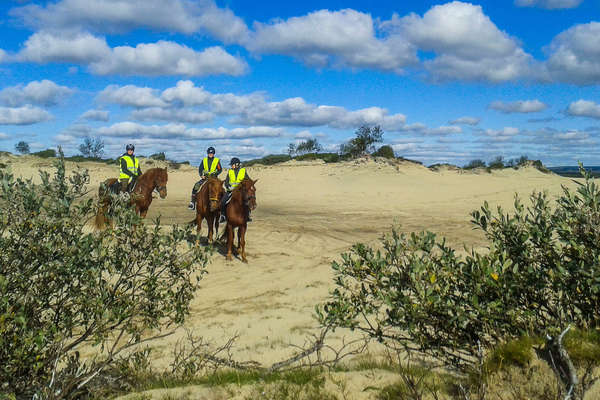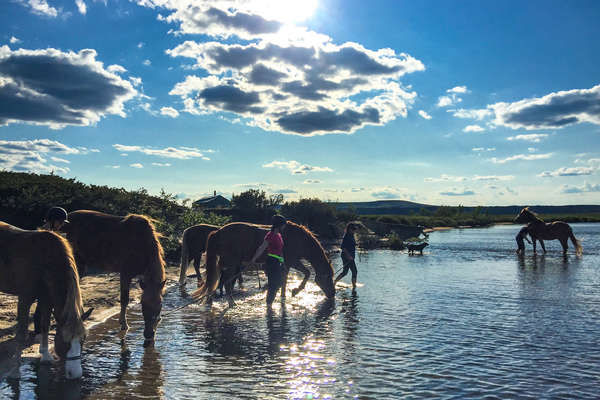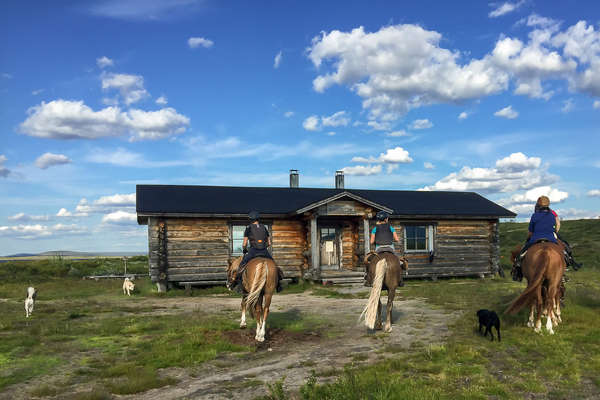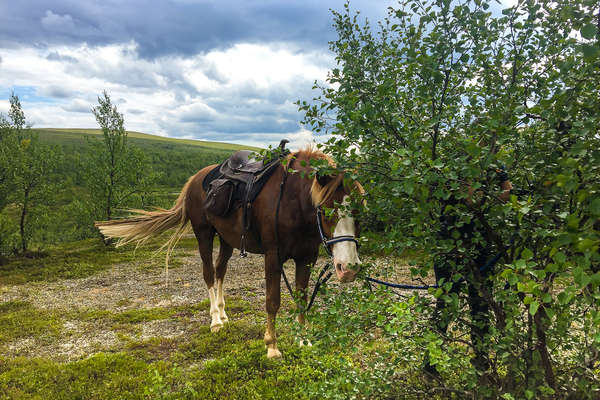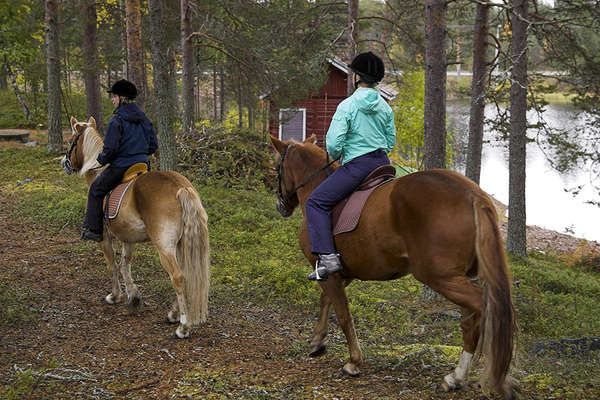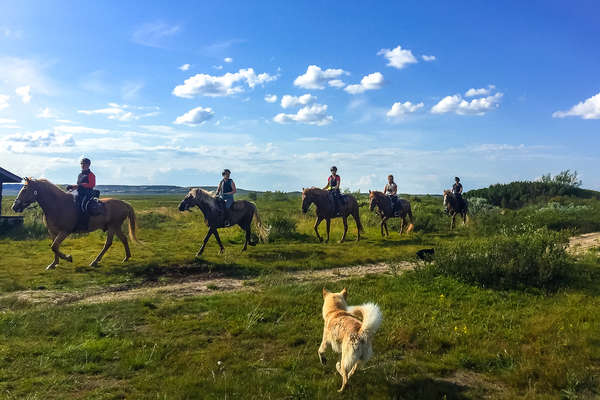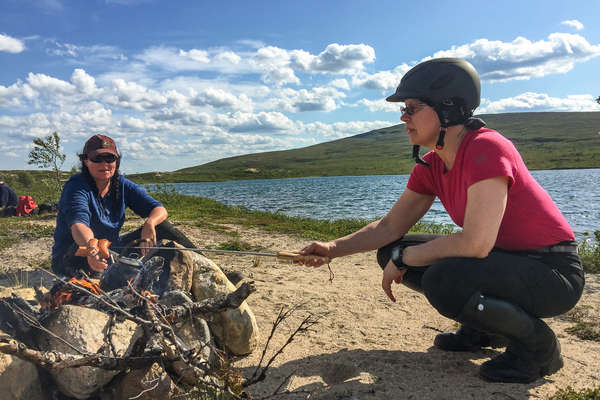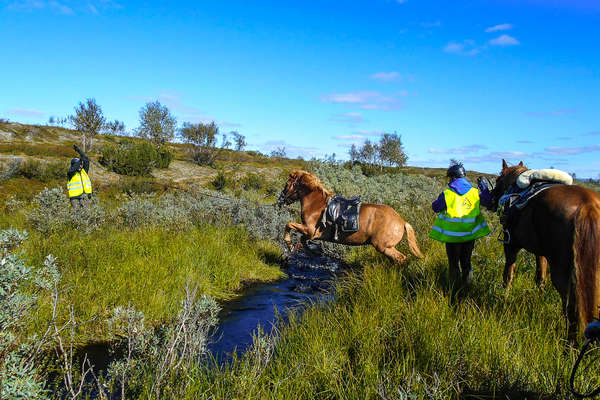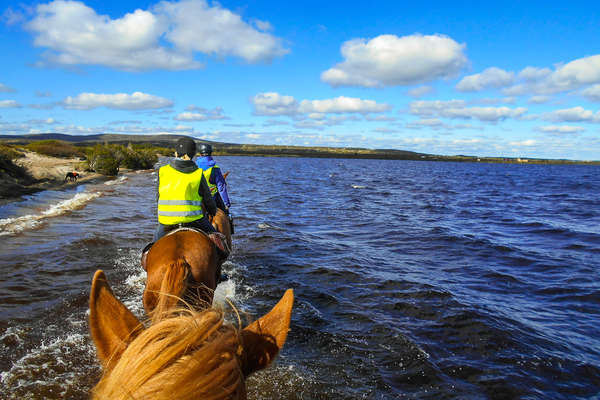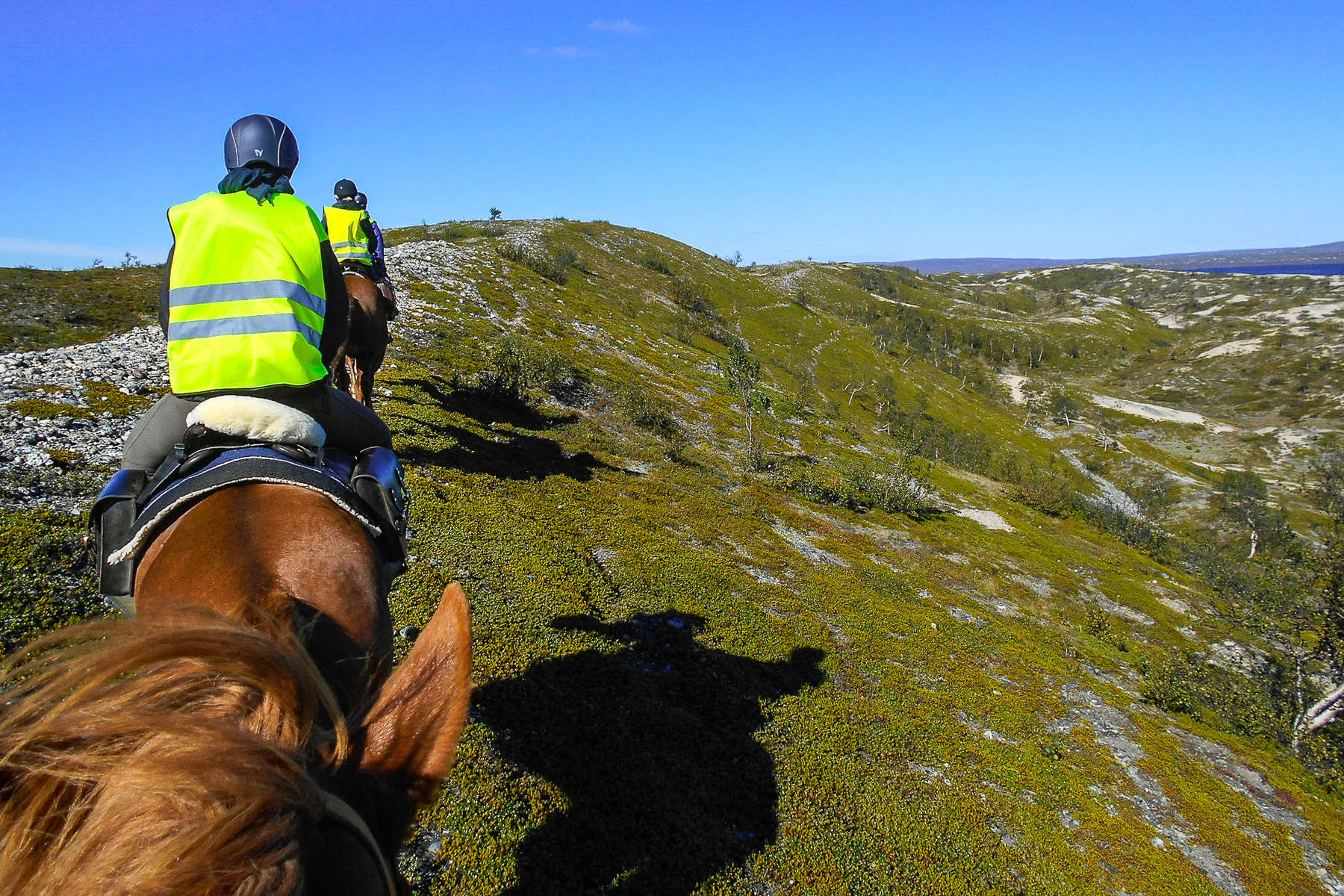
From the horse’s mouth
Itinerary
Highlights
- Stay in rustic cabins in the wilderness, with no water or electricity: into the wild!
- Enjoy the Finnish culture and authentic cuisine of delicious fresh salmon, herring, reindeer meat, Kainuu cheese, mushrooms and wild berries
- Experience the phenomena of the midnight sun
Dates & prices
Price details
- Rates are per person, based on riders sharing simple communal accommodation.
- Groups are made up of 4-6 riders plus English-speaking guides
- If you wish to hire a sleeping bag and liner, a price of approx £20/€25 per person for the week can be paid on arrival.
- Extra activities (canoe tours, hiking tours) can be arranged, please contact us
- Children aged 12+ are welcome to join the ride depending on their level of fitness and riding abilities.
- New dates can be opened on request for groups of 4+ riders.
- Rider weight limit: 110 kg/ 17.3 st / 242 lbs
Please Note
The itinerary may be modified at anytime for security reasons, meteorological or events beyond our control such as blocked roads, rivers in flood, drought, strikes and local holidays. Equus Journeys, our local partners and their local guides will always strive to find the best solution and will alter the itinerary as needed.
The names of the hotels and accommodation are given for information only and depending on availability, they may be modified without notice and replaced by another of a similar standard.
Price includes
Support Team
Logistic
1 support quad
Inland transports
Accommodation
Meals
Additional equipment
Price doesn't include
Meals
Transports
Extra
Insurance
Visas and personal purchase
Optional
Accommodation
Extra activities like canoeing tours, hiking tours
Equestrian info
Horses
Guide & local team
Minimum riding ability
Minimum riding ability
Pace
Tacking ability and participation
Trip conditions and Requested experience
It is essential that you approach this trip understanding that the accommodation will be basic and you will be living rustically, out in the open, with rudimentary facilities. You will spend several nights in communal dormitories, which will include sharing toilet facilities.
No previous trail ride experience is necessary, though a love of wildlife and the great outdoors is essential!
Equestrian equipment
Horses are ridden in English saddles.
We recommend our riders to wear a helmet to the correct standard and you should bring your own to ensure a proper fit
Travel info
Comfort
At the equestrian centre, a converted former school, a warm welcome awaits you; the centre's accommodation is basic but comfortable, consisting of dormitory rooms with shared bathrooms.
Whilst out riding the trails, you will sleep overnight in either kota (traditional tents) or in rustic log cabins with no running water or electricity.
Meals
Climate
Tips
Packing list
Head
- Equus Journeys STRONGLY recommends wearing a helmet. We recommend our riders to wear a helmet to the correct standard and you should bring your own to ensure a proper fit. Helmet makers (GPA, HKM, LAS Helmets, Lamicell, Troxel, Equithème) now offer horse-riding helmets that are ventilated, strong and light and comfortable. Alternatively, under hat protective wear is available (Ranch & Rider, Lexington Safety Products) as well as western helmets (Troxel).
- Sunhat
- Sunglasses - with a cord attached so they don't fly off when riding
- Buff or bandana
- Warm hat for cold nights when camping
Upper body
- Thermals (long or short sleeved)
- Long sleeved shirts provide protection from the sun and are an extra layer
- T-shirts
- Lightweight fleece or jumper
- Warm fleece or jumper (and a spare in case one gets wet)
- Warm and waterproof jacket - it can rain at any time of year and the evenings can be particularly cold
- Swimming costume - for swimming/bathing in rivers/hot springs
Legs
- Lightweight, comfortable riding trousers or jodhpurs - we recommend riding in them at home before taking them on holiday to ensure they don't rub
- Thermals
- Casual trousers for the evenings, such as jeans or tracksuit bottoms
- Waterproof over trousers
Hands and Feet
- Comfortable riding boots. We recommend short boots/hiking boots with half chaps but you may wish to take long chaps as an extra layer against inclement weather. We don't recommend taking your favourite long leather boots in case they get damaged
- Waterproof shoes/boots can be useful for abundant dew in the mornings or when it rains
- Trainers/Crocs or equivalent light shoes for moving around the camp in the evenings
- Several pairs of warm, thick socks
- Gloves - your hands are particularly exposed to the sun, cold or rain whilst riding. Waterproof gloves can be particularly useful
Nightwear
- Sleeping bag - one with a protection factor down to - 5 celsius, but we strongly recommend one with at least - 8 or 10 celsius
- Sleeping bag liner - silk, cotton or fleece - to add an extra layer of warmth
- Inflatable mattress or sleeping mat - strongly recommended
- Pyjamas, tracksuits or thermals for sleeping in
Other useful items
- Towels - camping ones will both dry and pack more easily
- Small backpack for accessing items required during the day (carried by support crew)
- Camera and high capacity memory card. Spare battery
- Bumbag for carrying your camera and small items whilst riding
- Headtorch or small torch for moving around camp at night - bring spare batteries and bulbs
- Water bottle (2 litres or 2 x 1 litre)
- Swiss army knife
- Wet Wipes or equivalent (for when washing facilities aren't available)
- Toilet paper and a lighter to burn it with after use
- Small plastic bags for your rubbish
- Ear plugs (for light sleepers)
- A soothing cream will be useful to treat areas irritated by long hours in the saddle
- Mosquito spray/bite soothing cream, and, possibly, mosquito net. Mosquitoes are everywhere in the summertime!
Medical kit
- Any medication you regularly take
- Sunscreen and lip balm - should be high factor
- Insect repellent, preferably containing deet
- Blister plasters in case of any rubs
- Antiseptic cream, plasters, aspirin, anti-histamine, insect-bite salve etc...
- Spare prescription glasses/contact lenses
- Eye drops
- Imodium or similar anti-diarrhoea medication
- Re-hydration sachets
- Water purification tablets
- Antiseptic wipes
- Handwash gel
General recommendations
- Backpacks cannot be worn whilst riding. We recommend a small bumbag or a coat with pockets so that you can carry small items with you during the day (passport, camera, sunscreen, lipbalm etc)
- Please don't take a hard sided suitcase. Your luggage should be soft sided with a capacity of 60-80 litres. We recommend taking a backpack or similar.
- We recommend taking a copy of your passport and insurance documents with you in case you lose your originals
- We recommend travelling in your riding boots and carrying your hat and some riding clothes in your hand luggage - then if your luggage goes astray you are still able to ride!
- Please take your rubbish home with you. There are no recycling facilities, so take your used batteries, aerosols etc. back home and dispose of them appropriately. Try to leave excess packaging material at home before travelling
- If you prefer travelling light, please choose a biodegradable soap or washing powder/liquid to do you laundry once in the country
Sustainable tourism
- Travel light. It's a little known fact, but the lighter you pack, the better for the environment as heavy bags will produce higher emissions (when flying a plane or driving a car!).
- Reduce plastic waste. Take your favorite reusable bottle with you. Avoid single-use bags, cups, or straws.
- Preserve nature. Always take your rubbish with you during the ride and recycle them. Leave all the flowers or plants as you found them, and never get too close when observing wildlife. Make sure to use eco-friendly products such as body wash or laundry detergent (if camping) to protect both your skin and the environment.
- Choose your experiences carefully. Respect animal life by not participating in any activities that abuse wild animals (shows, elephant rides, etc.).
- Support local populations. Buy local handicrafts, be respectful of customs, and learn about the culture of local communities.
- Share! Raise awareness among your family and friends about sustainable tourism.
Did you know?
Did you know?
The Finnish horse
The only native horse breed in Finland, the Finnish horse is well suited to the needs of his country, being as equally suitable for farm work and trotting races. It is claimed to be among the fastest and most versatile "coldblood" breeds in the world.
Its exact origins are not currently known: although it originates from domesticated horses, there are many theories about its origins. One refers to the north-European horses imported by the Vikings, another to Mongolian horses imported by other tribes.
From the 1500s, they are bred with lighter breeds or half-blood breeds, resulting in larger and more suitable horses. The numbers decreased, due to the mechanisation of agriculture and the dismantling of the Finnish horse cavalry over the second half of the 1900s.
The Finnish horse is powerful, versatile, characterized by a chestnut coat that usually comes with a flaxen mane and tail and white markings.

